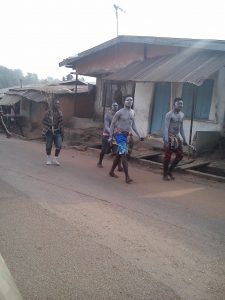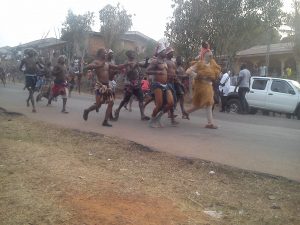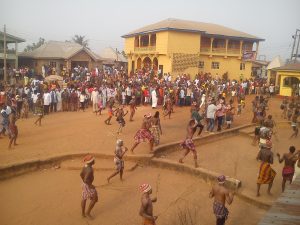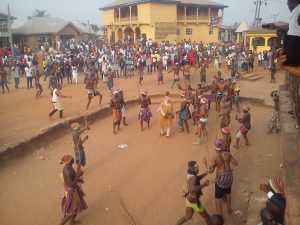Away from the hustles and class of the city, the average Nigerian looks forward to a Christmas at “home” with extended family; that annual gathering of relations under a roof as the case may be. Where culture has not been neglected, and traditions have not been crushed under the wheels of caterpillars and dredgers, “home” becomes the perfect choice of the busy working-class Nigerian.
Known as “Mba ji isi acho isi”, Ohafia remains a pride to her children and her visitors. Okagwe is one of the promising communities of Ohafia in Abia State. Christmas in Okagwe (Ofiri Nmaku) Ohafia is incomplete without the display of Ekpe on the 1st of January every year. The masquerade display is the most-awaited event of the holiday.
In the wee hours of January 1st, say 6am, the gunpowder gives a loud bang at the famous Agbala Ikoro. Everyone is notified that the Ekpe will be out in the evening. No one wants to be left out as activities are hurried. The “city” children who seem to be engaged in the new life of drawing water from the village well and foods cooked over firewood flames, get excited and ready to follow the masquerade around.

The feeling becomes stronger as the young men spend their mornings and early afternoons gathering branched sticks which will serve as canes. At 3pm, they are seen dressed in wrappers tied over shorts, and native chalk (nzu) smeared over their bare chests and faces as desired. No fun can be compared to the feeling of waiting for the masquerade at the dressing room and then escorting it to the Bibia Ete Square. The home-based cousins become tour guides and lead the city-blooded cousins around the village to have more fun. At 4pm when Ekpe approaches the square, another loud bang is heard and shouts of “Ekpe apusale” (Ekpe is out) can be heard amongst the people.


With a rope tied to its waist for the people’s safety certainly, the Ekpe runs into the village square pulling a group of young men with it. The masquerade begins her visit to the meeting halls, referred to as ‘obu’, of the compounds that make up the Okagwe community – Ndi Obasi, Ndi Obu, Ndi-Ufere, Eziukwu and others. The Ekpe is welcomed by elders at the obu and receives wine offerings after a graceful display. Visits around the various meeting halls come to an end and Ekpe takes over the open space of Bibia Ete Square, Eziukwu compound and Ndiufere obu. Shouts of Eh-Ohh, like that of warriors, feel the air. The dust becomes a part of the display, with the youths and children running for safety, away from the hungry canes of the masquerade escorts.


As it dances to the beats of the drummers who strive to live up to expectation lest they get a fair share of the cane, it turns at intervals to whip his boys who turn on each other, flogging as hard as they can. The only escape route for them is lying down.
To the young city boys, it is wise to put a few notes in your wallet. Oh yes, if your cousin has the native chalk on his bare chest with a stick in his hand, and happens to be with the Ekpe, he’ll approach you for a note or two. In the absence of any, you are getting a taste of his cane. That’s the fun!!!
Home remains the best!
Sincerely, thank you for reading.
You are the reason why we keep telling these stories. Our mission is to inform, educate, and inspire through objective storytelling and journalism. We are deeply grateful for your belief in our mission. To enhance your user experience, we've got off a lot of things such as obstructive ads. However, telling these stories and making these researches require funds. If you enjoy our content and you want to see us continue, please kindly support us by donating here.You can also send us an email hello@yolar.co. Thank you for your continuous support. ![]()



